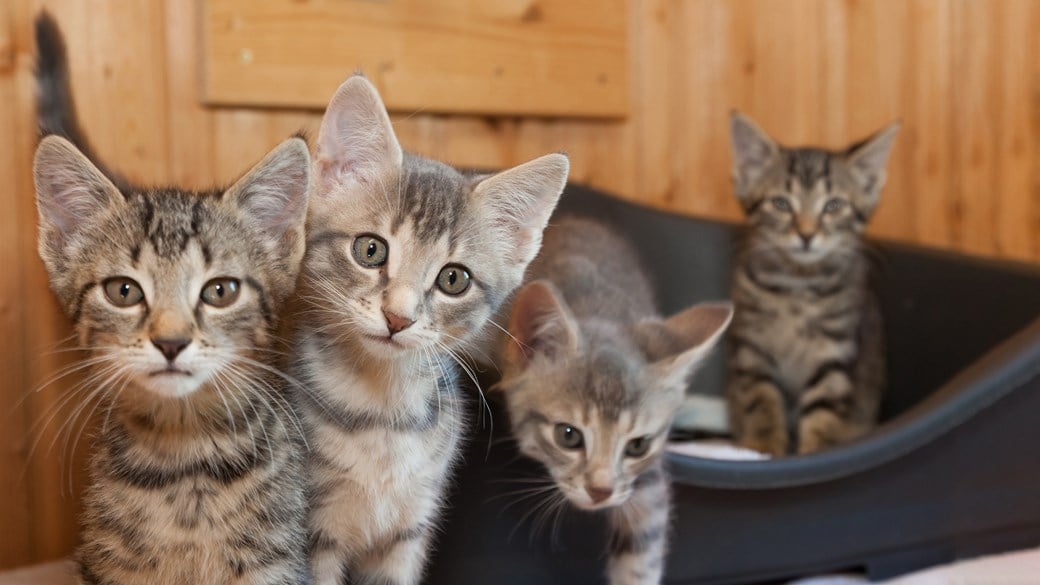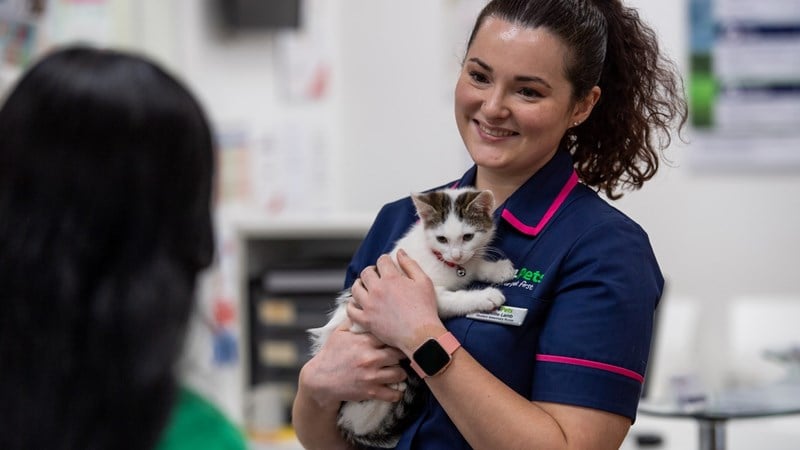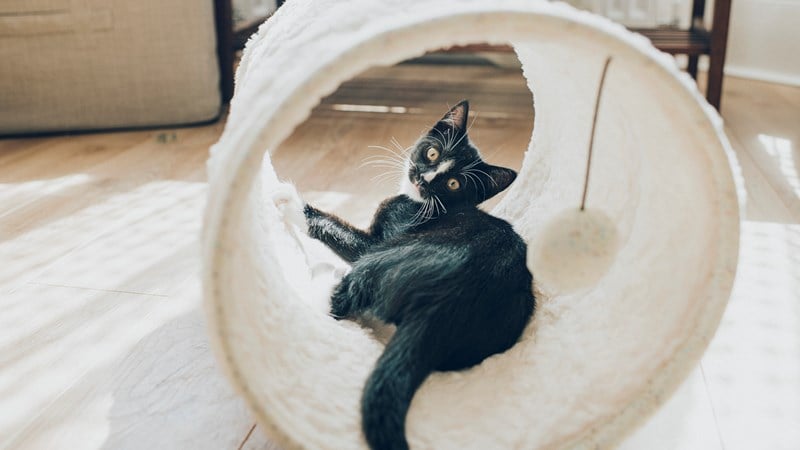
The Kitten Socialisation Period
The socialisation period lasts until your kitten is 7-8 weeks old, so this means for most owners it has passed before you pick up your new addition.
The socialisation period is a time when your kitten is most open to new experiences, and is a great time to get them used to a lot of potentially scary parts of life like being picked up, or hearing the vacuum cleaner. This doesn’t mean you don’t have to think about the socialisation period though.
It’s really important for your kitten’s personality development, so speaking to the breeder or rescue about the experiences your kitten has had in their care can give you a good indication of how their socialisation has been. Poorly socialised cats can still be great family members, but they make take more patience and need more help to learn to be part of a family environment. They may also always be more naturally timid pets.
Read more about the kitten socialisation period
The socialisation period is the very early time in a kitten’s life where they learn how the things, noises, people and animals around them ‘fit’ into their life. This means leaning which are safe and friendly, and which they should be scared of, and how to relate to these encounters.
Kittens are very open-minded during this period, and if they have a positive experience with something, they are much less likely to develop any phobias or issues regarding that encounter in the future.
This makes the socialisation period the perfect time to get your kitten used to a wide range of experiences, including hearing lots of noises, meeting other animals and people, meeting children, and handling.
The wider the range of events, environments and situations your kitten has been exposed to the better, as long as your kitten always felt safe, happy and not overwhelmed.
There is some debate about the length of the socialisation period, but most specialists agree that it lasts from birth to between 7 and 8 weeks of age. This doesn’t mean that you should stop teaching your kitten new experiences after this age, it just means that they may be a little more wary. In fact, you should continue helping your kitten have positive new experiences throughout their life, and especially within their first year.
Well socialised kittens adapt well to new situations, are happy in the company of other pets and people, are much easier to exercise and travel with, and generally make easier and successful pets. Poor socialisation can sadly result in kittens which grow up fearful, shy and even aggressive.
As the socialisation period usually ends before you being your new kitten home, it’s important to understand how critical this early period can be for a kitten. They are learning all the time, and kittens brought up in a busy household, and who are handled regularly, will learn much more about living in a family environment.
Our article on choosing a kitten is a great place to look for advice on how to choose a kitten that has had good socialisation.
If you have bred your kitten yourself or are in an unusual circumstance you may have your kitten during the socialisation window of birth to 7-8 weeks old. If you do, it’s really important to use this time wisely to get your kitten used to lots of different situations, especially those they will be encountering regularly within your home and lifestyle.
Don’t forget that you cannot let your kitten out until they have had their second vaccination and this has had time to take effect.
Some suggestions for socialisation activities include:
- Playing noises such as thunder/train/traffic on the internet so your kitten has heard them.
- Meeting lots of people – The more people your kitten meets the better, so long as they enjoy themselves. Think about all the variety where people are concerned, and try and introduce your kitten to everyone. Things like age, race, body shape and headwear can make someone look very different to a kitten!
- Don’t forget about children – Even if you don’t have children of your own, children are likely to show interest in your cat throughout their life. Children often interact with cats very differently to adults and can be much less predictable. Helping cats get used to children during the socialisation period will make it much easier for them to be around children as they grow up.
- Visiting the vet - Early vet visits often come with a needle, and this can set cats and vets off on the wrong foot for life. Popping in to your local Vets4Pets with your new kitten for a cuddle with the team and some treats (and no needles!) is a great way to teach your kitten that the vets isn’t a place to be scared of.
While you may have passed the socialisation period when you pick up your new kitten you can still help them get used to new experiences.
Here are some top tips!
- If your kitten looks nervous about an experience distract them with play, and act normally until they are no longer looking worried. Once they are relaxed, give them praise and treats.
- Positive learning only works if your kitten is having fun! Other people can be unsure about how to go about interacting with your kitten, so don’t be afraid to give them guidance, arm them with some of your kitten’s favourite treats, and stop them picking up your kitten or looming over them.
- Children may need more help to interact calmly with your kitten.
- If you think any social interaction is too much for your kitten, don’t be afraid to calmly and politely take them out of the situation.
- Kittens have short attention spans and tire easily, so keep encounters short and make sure your kitten has plenty of time to rest.
- Let your kitten bring themselves into an encounter, if you can. Let them approach people or situations in their own time, and never force them into an encounter.
Health Plans to keep your kitten healthy
At Vets4Pets we offer a range of Health Plans that make essential routine treatments more affordable. You'll save money on things like annual vaccinations, flea and worm treatment and routine health check-ups.

Join our free Kitten club
Join the club for expert advice and tailored offers, including £30 off our Complete Care Health Plans

Puppy & Kitten Advice
Giving your pet the best start in life begins with getting the best expert advice.
